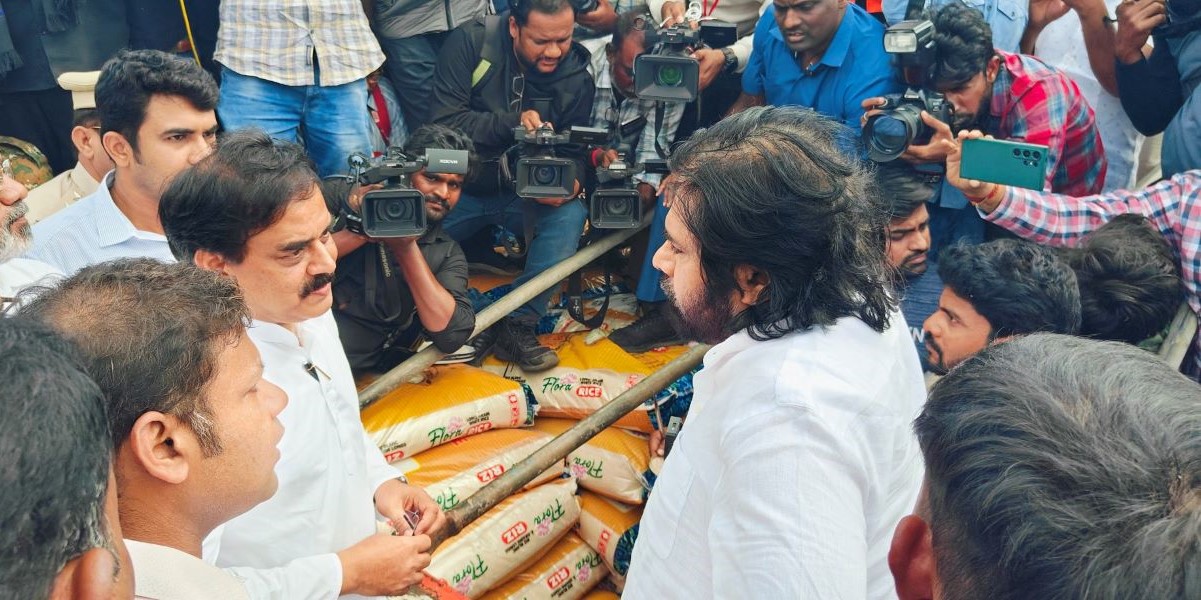The government constituted the SIT based on the report submitted by the Director General of Police, that an inquiry by such a probe panel was needed for a focused investigation into 13 cases that had been filed in connection with the illegal export of PDS rice in Kakinada district.
Published Dec 07, 2024 | 12:41 PM ⚊ Updated Dec 07, 2024 | 12:41 PM

Pawan Kalyan at the Kakinada port. (X)
Not losing much time after Andhra Pradesh Deputy Chief Minister Pawan Kalyan’s “raid” of Kakinada port and Stella L Panama vessel on the high seas in the Bay of Bengal off Kakinada port on 29 November, the state government has constituted a special investigation team (SIT) to get to the bottom of the smuggling of public distribution rice from the port to Africa.
When the deputy chief minister raided the cargo ship, it had 38,000 tonnes of rice including 640 tonnes of PDS rice, already loaded when the vessel was set to sail.
The SIT, constituted by the government, will be headed by Inspector General of Police, CID, Vineet Brij Lal. The other members are CID SP B Uma Maheswar, DSPs T Ashok Vardhan, M Balasundar Rao, R Govinda Rao and M Rathaiah. A GO to this effect has been issued by chief secretary Neerbh Kumar Prasad.
The constitution of the SIT is being viewed as the state government’s first decisive move to fix YSRCP leaders who bent the rules and laws when their party was in power and made tonnes of money.
In the case of smuggling of the PDS rice out of Kakinada port, the Sword of Damocles now hangs precariously on former YSRCP legislator Dawarampudi Chandrasekhar Reddy who is alleged to have been involved neck-deep in the smuggling of rice out of the port
The government constituted the SIT based on the report submitted by the Director General of Police, that an inquiry by such a probe panel was needed for a focused investigation into 13 cases that had been filed in connection with the illegal export of PDS rice in Kakinada district.
The DGP said there was widespread concern over the illegal export of rice, necessitating action against those responsible. Hence the request for the constitution of an SIT.
The SIT has been scrambled based on the report by the Director General, Vigilance & Enforcement that investigation into the PDS rice has revealed a deeply entrenched network bred corruption and organized criminal activities.
The report said that the organised illegal export of subsidised rice had evolved into a sophisticated operation involving millers, exporters and influential individuals with deep political connections.
The DG V & E also informed the government that subsidized rice is either polished to enhance its appearance or rebranded with falsified labels to resemble premium export quality rice to fetch significantly higher prices in international markets, particularly in African countries where the demand is high.
The exporters, the report said, often worked in collusion with customs House agents, falsifying documentation to misrepresent the rice as non-subsidized varieties like parboiled or broken rice, concealing its origin.
The DG V & E has informed that the operation exploited weak enforcement mechanisms at key export hubs including the ports of Kakinada, Krishnapatnam and Chennai and recommended entrusting the scam to a specialised agency for investigation.
The government formed the SIT, convinced that the smuggling network operates with alarming efficiency, exploiting the very systems meant to ensure food security for the state’s most vulnerable populations.
The SIT has been asked to identify the key perpetrators and ensure robust legal action against the individuals concerned.
The SIT has been authorized to call for any relevant information and assistance from any department of the government in the course of its investigation.
All government departments have been directed to cooperate with the SIT, in the discharge of its duties and duly submit any information or technical assistance called for.
The SIT will have the powers to search and seize documents, examine witnesses, and arrest and detain accused persons in accordance with law.
(Edited by Sumavarsha Kandula)
